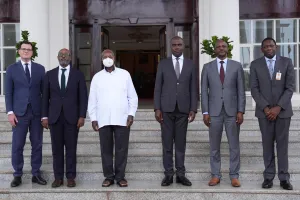
Donald Trump has renewed his call for a 100% tariff on all non-American films, arguing that the U.S. movie industry has been “stolen” by foreign countries. Speaking on Monday, the former president claimed California had been hit especially hard and insisted the tariff would “solve this long time, never ending problem”.
Back in May, Trump had already signaled his intention to consult Hollywood executives and move forward with the tariff plan, warning that the American film industry was facing “a very fast death”.
His latest comments come shortly after he unveiled a new round of tariffs, including a 100% tax on imported branded or patented pharmaceuticals, and 50% tariffs on imported kitchen and bathroom cabinets.
Posting on Truth Social, Trump stated: “Our movie making business has been stolen from the United States of America, by other countries, just like stealing ‘candy from a baby’.
California, with its weak and incompetent Governor, has been particularly hard hit!”
He also confirmed the planned levy would apply to “any and all movies that are made outside of the United States”. However, Trump has not provided a timeline for when the tariffs would take effect, and the White House has not responded to requests for comment.
It remains unclear whether these tariffs would apply only to theatrical releases or extend to streaming platforms like Netflix. There has also been no explanation of how such tariffs would be calculated or enforced.
Investment analyst Dan Coatsworth from AJ Bell voiced skepticism about the feasibility of such a move, noting that tariffs are typically applied to physical goods, not creative content.
“The threat of 100% tariffs on movies made outside of the US raises more questions than it does answers,” he said.
“Filmmakers have been progressively lured by tax incentives that come from shooting movies in other parts of the world, and the Los Angeles film industry has lost its glitz and glamour.”
Coatsworth also questioned how an "American-made" movie would be defined, especially in cases where a film is shot in the U.S. but involves foreign directors, actors, or financing.
“So it’s hard to understand just how Trump intends to impose the levy,” he said.
“Theoretically, being forced to produce movies in the US could push up their costs.
Content makers would pass on this cost to the customer and that could hurt demand for streaming companies and cinema operators.”
Despite Trump’s threats, Coatsworth noted that investors currently don’t appear to be alarmed. Stocks for companies like Netflix and Disney experienced only brief dips before rebounding.
Several recent blockbusters from American studios were actually filmed abroad, including Deadpool & Wolverine, Wicked, and Gladiator II.
According to film research firm ProdPro, the U.S. continues to be a key player in global film production. Their annual report showed $14.54 billion in domestic production spending last year, although that figure represents a 26% drop compared to 2022.
Meanwhile, countries like Australia, New Zealand, Canada, and the UK have seen increased production investments since 2022, thanks in part to competitive incentives offered to filmmakers.













Aldrige Kennedy
Leave a Comment
Your email address will not be published.